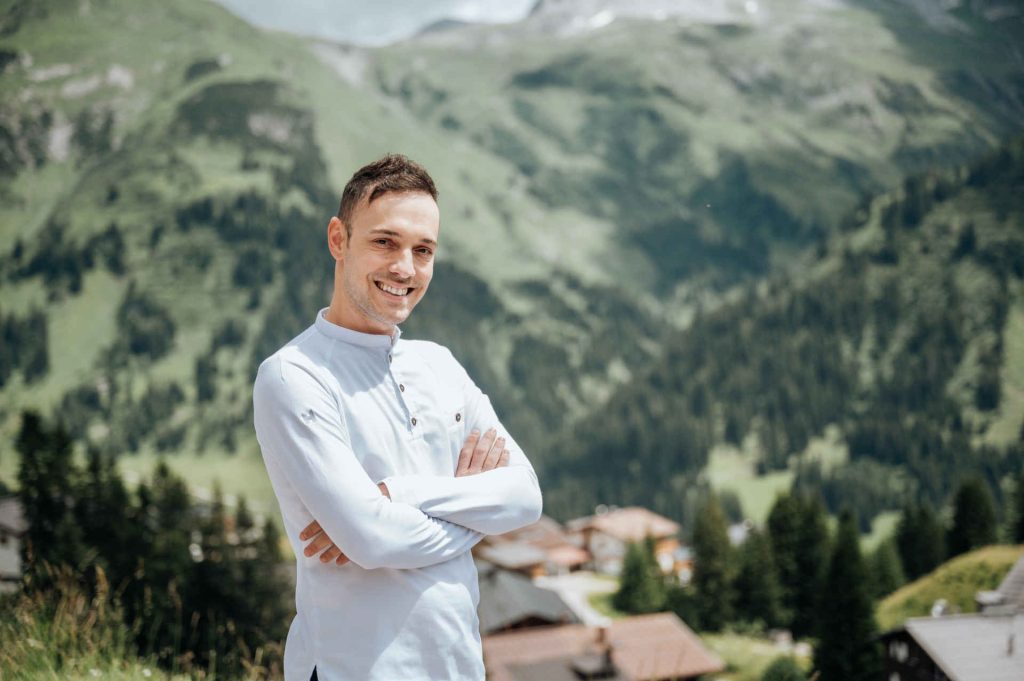
“I wanted that too – to make people happy with my food. That passion drives me.”
At the Hotel Goldener Berg in Oberlech, chef Theo Alexis is redefining Alpine cuisine. With a range of ketogenic, alkaline, and plant-based menus, he proves that even meat lovers can be enthusiastic about vegetables. In this interview, he talks about the combination of Austrian and Greek influences, his extraordinary signature dishes such as oven-baked watermelon, and what makes a good leader in a large kitchen.
ALEXANDRA GORSCHE: Theo, you offer ketogenic, alkaline, and plant-based menus. How does that work in practice?
THEO ALEXIS: It's something I personally find very exciting: working with all these special diets. Each of these diets is very healthy, so every guest can find exactly what suits them. I find it fascinating because not many people do this. It takes concentration to bring everything together, and at the same time, different menus have to be created that are still connected. This makes it easier for us in the kitchen to work with the highest possible quality – and guests have more choices.
You come from Greece. Do we also find Greek influences in your cuisine?
Absolutely. Anyone familiar with Greek cuisine will recognize the blend of the two cultures that I bring together. Of course, Austrian cuisine, with its products and philosophy, always comes first, but it's great when we can combine that with other influences, such as Greek or international cuisine. We use regional products, but sometimes we combine an ingredient with a recipe to create something completely unique and new.
Where does your passion for cooking come from?
My passion comes from my mother – and it has stayed with me to this day. She was my inspiration because I watched her cook when I was a child. When we liked her food, she beamed. That feeling shaped me: I wanted that too – to make people happy with my food. That passion drives me. Being in the kitchen, trying out new ingredients and recipes, always gives me the drive to keep going. I'm actually happier in the kitchen than outside.
Do you have a signature dish?
I have many dishes that I would call signature dishes. But something completely new that we've been trying out in recent weeks is watermelon. We cook it in the oven for several hours, let it dry, and then cook it again. In the end, it has the texture of tuna. We serve it as carpaccio, as ceviche – there are many variations. It's new and, for me, a real signature dish.
How do you convince meat lovers of plant-based cuisine?
Most of the time, I let the ingredient itself take center stage. But when I know I'm cooking for meat lovers, I use spices and herbs that are normally used to season meat – just on vegetables. The preparation is also based on similar methods. This creates a result that is very familiar to guests.
What do you see as the difference between alpine and urban cuisine?
There's a big difference that I really appreciate. The pace here is completely different. In the mountains, you have time, clear air, and a peaceful atmosphere that encourages creativity. In the city, there are so many distractions and noises that it's often impossible to really think. Here, we have the peace and quiet and quality of life we need to be creative.
You are not only a chef, but also a leader. What makes a good chef a good leader in your opinion?
As a leader, I always stand by my team. I cook with them, I stand in the front row and move forward together with them. I don't sit in the office and give instructions, I lead from the front – and that ensures that people listen to me and follow me. I don't just have one method for everyone, I respond to each individual's personality.
How big is your team?
In summer, there are around ten chefs in the kitchen, in winter significantly more – around 22 people. That's a big team. But what I particularly appreciate about the Goldener Berg is that we really are a team. It's not just a word, but a living reality. That's crucial because it means we're all moving in the same direction and achieving common goals. Everything works much better that way – you're not a bunch of individuals, but a unit.
What advice would you give to young chefs?
They should explore the roots of each culture and learn to cook simple dishes first. Once you've mastered the basics, you can build on them to develop your own signature dishes. You don't have to follow trends –you should be the trend! Step by step, with patience and passion. Because without a genuine love of cooking, it's not possible.
You work very sustainably. Do you have a wish for your colleagues?
My only wish is: never stop doing what you're doing. In my eyes, everyone is perfect and doing exactly what they're here to do. There's no reason to change anything. That's my wish – that we stay the way we are. And I think that's really wonderful.
I'm actually happier in the kitchen than outside.
I'm actually happier in the kitchen than outside.



At the Hotel Goldener Berg in Oberlech, chef Theo Alexis is redefining Alpine cuisine. With a range of ketogenic, alkaline, and plant-based menus, he proves that even meat lovers can be enthusiastic about vegetables. In this interview, he talks about the combination of Austrian and Greek influences, his extraordinary signature dishes such as oven-baked watermelon, and what makes a good leader in a large kitchen.